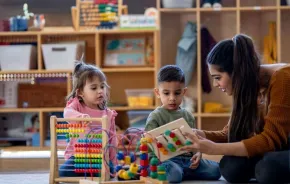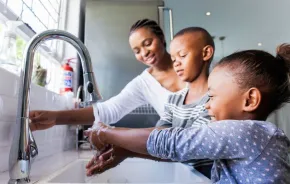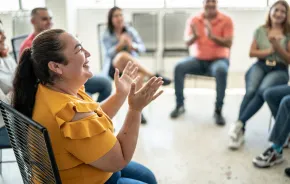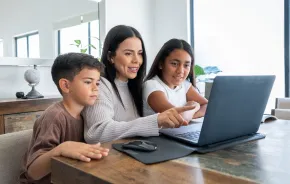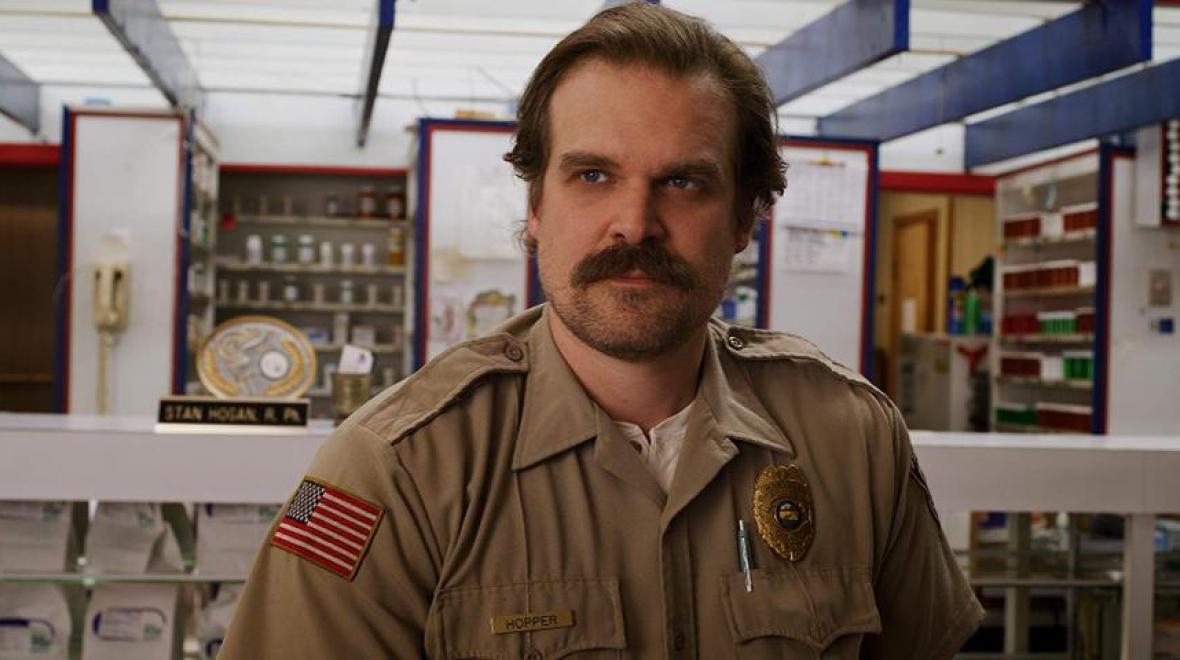
Photo:
Netflix
For two seasons of “Stranger Things” I sat judging Hopper’s incompetent ass, indicting his antagonism, recoiling at the ways he was forever poking the bear. But Hopper’s note to Eleven at the end of season 3 shattered all of my bad feelings about him. Because, who am I to judge? Hopper personifies the rage, confusion and mostly fear that typify the experience of raising a teen with no owner’s manual and no experience.
It’s been about four years since I stumbled, clumsily (though perhaps not quite as belligerently as Hopper), into my oldest kid’s early teen years. He’ll be a senior this fall, and while sometimes I still feel like I’m in the thick of it, other times it feels like I’m just beginning to poke my head out from the bunker.
The day he started high school, my son had been out of the hospital for only two days. What’s the worst that can happen with a broken arm, you might wonder? A bone infection is probably right up there. I’ve never been sure how much this prologue of him falling off his bike, followed by surgeries and then hospitalization and high doses of medication could play into his rocky struggle or how much of it was pure teenage angst, but the summer of eager anticipation and years of being upbeat about school crumbled on that first day of his freshman year.
“So, how was it?” I asked when I picked him up. He shrugged, his left arm held close in his tired blue sling. “Ehhh,” he replied without making eye contact. It was clear he didn’t want to talk about it. As the weeks wore on, so did his indifference. I called the nurse. Could he be depressed? Could it be from the antibiotics? “No,” she insisted. “He’s just been through a lot.”
Sometimes when he had been holed up in his room for hours, I’d knock softly on his door. “What?” he’d ask, gruffly. “Can I come in?” Nothing. I’d inch the door open. He’d look up, then back down and I’d slowly crawl onto the bed next to him, but not too close. I wanted to hold him as I did when he was little; I wanted to understand, to make everything better. But the more questions I asked and the more I empathized, the more I became the source of his angst. Our rules were too strict, I was overbearing and controlling. He shouldn’t have screen-time limits, he couldn’t wait to move out.
Since my son was about 6, I’d been the source of his frustrations, in various iterations. At that age, he’d hunker down and refuse to leave a play date or flail and scream and cry when I denied him an expensive gadget at a garage sale. Not having experienced dealing with such tantrums when he was a toddler, I felt ill-equipped to handle them at elementary-school age. My brain and emotions went straight to panic and embarrassment and fear. And like all parenting-related things, I bumbled through, making lots of mistakes. At 6, these things pass: You can drag a kid out of the play date, you can bike home from the garage sale as he wails. The next day it’s over and you’re both lying side by side on your tummies in the grass, ooh-ing and ahh-ing over a praying mantis.
At 14, there is no quick recovery. There is not a go-to bonding moment. Some nights my son would be up for watching an episode of “Supernatural” with me, sometimes while leaning on my shoulder, others sitting on the opposite end of the couch, enduring my giggling and pulling up old clips from when Dean was Eric Brady on “Days of Our Lives.” Other nights — most nights — he’d only want the seclusion of his room.
Distance.
Hopper acknowledged that he was feeling scared because El had been more distant. It’s normal, he knows. We all know this on an intellectual level. Kids grow up, become teenagers, and need their own space to discover who they are and to develop their own interests and identities. They need lots of alone time, and the isolation of those early teen years marks a developmental milestone. But, like other things, what parents know on a head-level doesn’t always translate to the heart, and that distance can feel terrifying.
How does his sudden shift of hours and days spent in his room not translate to a rejection of sorts? It’s funny how many of my own insecurities bubbled to the surface during this transition. Was he mad at me? Was I a bad parent? Too strict? Too lenient? What were other parents doing? Did they struggle, too? Unlike the early days of parenting babies and toddlers, I didn’t find many parents disclosing their feelings and struggles navigating the teen years.
Our teens aren’t out fighting demogorgons or face-sucking monsters, but those feel like perfect allegories for the wrestling that happens near the beginning of high school. My teen wasn’t possessed by the Mind Flayer, but I still couldn’t claw my way in to find him, to reason with him, to discover how worried I should be or whether to just let him sleep it off.
I used to wonder how parents with teens nearing adulthood coped with the transition. How they weren’t constantly crying and in despair about their baby’s impending departure. As my own teen nears that age, I finally understand that that grief, that push and pull, that desire to turn back time doesn’t happen at 17 or 18; it happens closer to 14. It happens in the years leading up to launching, it happens in the separation — in the Band-Aid that doesn’t rip off cleanly, but rather in the agonizing slow pull, hair by excruciating hair, that covers the span of years, not minutes or months.
We can’t turn back time, and nearing the end of this stage with my oldest, I now know I wouldn’t want to.
I used to want to turn back time; to go back to when we’d read shoulder to shoulder, when he’d enjoy an outing with us to the beach — before friends and work and video games in his room took all of the front seats and we became distant objects in the rearview mirror behind him. But, from my vantage point now, I can reflect on the past with more clarity. Going back is just returning to a different time — a time that was also difficult, but in its own way. A time that was always preparing both of us for the teenage years — and ultimately for the separation of young adulthood.
Separation: the action or state of moving or being moved apart. Separating is almost always uncomfortable. From the benign furniture that leaves a crease in the rug to a divorce that leaves permanent emotional scars, the process of pulling away hurts.
Maybe I judged Hopper so harshly because as much as I don’t want to admit or acknowledge it, he reminds me of myself. He reminds me of the utter panic and bewilderment and desperation that accompanies parenting young teens. I want to forget those feelings, pretend I didn’t say, do or think the same kinds of things. Erase the door-slamming and the yelling. Could it have been more graceful? Probably, but I’ll never know. We can’t turn back time, and nearing the end of this stage with my oldest, I now know I wouldn’t want to.
I found Hopper’s last words from the finale as much an instruction to parents as it is to teens: Keep on growing up kid. Don’t let me stop you. Make mistakes, learn from ‘em. When life hurts you — because it will — remember the hurt. The hurt is good. It means you’re out of that cave.








